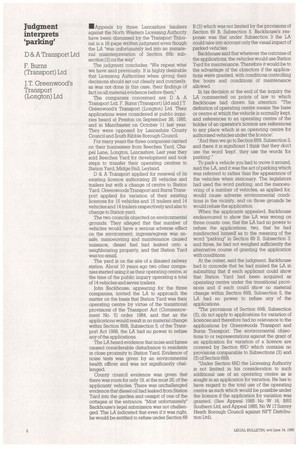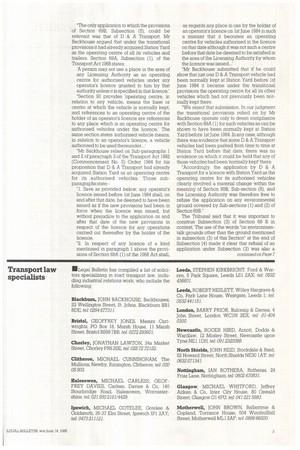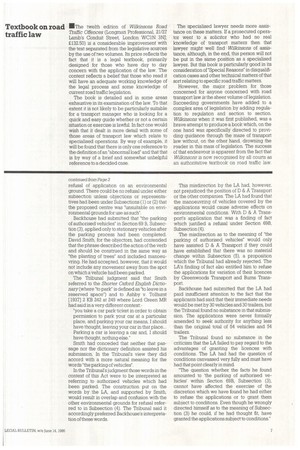Judgment interprets 'parking'
Page 24

Page 25

Page 29

If you've noticed an error in this article please click here to report it so we can fix it.
D & A Transport Ltd F. Burns (Transport) Ltd J. T. Greenwood's Transport (Longton) Ltd
• Appeals by three Lancashire hauliers against the North Western Licensing Authority have been dismissed by the Transport Tribunal in a 16-page written judgment even though the LA 'was unfortunately led into an immaterial misinterpretation of Section 69b subsection (3) on the war.
The judgment concludes: We repeat what we have said previously. It is highly desirable that Licensing Authorities when giving their decisions should set out clearly and concisely, as was not done in this case, their findings of fact on all material evidence before them."
The companies concerned are D & A Transport Ltd, F. Burns (Transport) Ltd and J.T. Greenwood's Transport (Longton) Ltd. Their applications were considered at public inquiries heard at Preston on September 26, 1985, and in Manchester on October 11 last year. They were opposed by Lancashire County Council and South Ribble Borough Council.
For many years the three companies carried on their businesses from Beeches Yard, Chapel Lane, Longton, Lancashire. Last year they sold Beeches Yard for development and took steps to transfer their operating centres to Station Yard, Midge Hall, Leyland.
D & A Transport applied for renewal of its existing licence authorising 25 vehicles and trailers but with a change of centre to Station Yard. Greenwoods Transport and Burns Transport applied for variation of their existing licences for 15 vehicles and 15 trailers and 14 vehicles and 14 trailers respectively and also to change to Station yard.
The two councils objected on environmental grounds. They alleged that that number of vehicles would have a serious adverse effect on the environment, ingress/egress was unsafe, manoeuvring and maintenance caused nuisance, diesel fuel had leaked onto a neighbouring property, and that Station Yard was too small.
The yard is on the site of a disused railway station. About 10 years ago two other companies started using it as their operating centre, at the time of the public inquiry operating a total of 14 vehicles and seven trailers John Backhouse, appearing for the three companies, invited the LA to approach the matter on the basis that Station Yard was their operating centre by virtue of the transitional provisions of the Transport Act (Commencement No. 8) order 1984, and that as the applications would result in no material change within Section 69B, Subsection 5, of the Transport Act 1968, the LA had no power to refuse any of the applications.
The LA heard evidence that noise and fumes caused considerable disturbance to residents in close proximity to Station Yard. Evidence of noise tests was given by an environmental health officer and was not significantly challenged.
County council evidence was given that there was room for only 19, at the most 25, of the applicants' vehicles. There was unchallenged evidence that diesel oil had leaked from Station Yard into the garden and cesspit of one of the cottages at the entrance. "Most unfortunately' Backhouse's legal submission was not challenged. The LA indicated that even if it was right, he would be entitled to refuse under Section 69 B (3) which was not limited by the provisions of Section 69 B, Subsection 5. Backhouse's response was that under Subsection 3 the LA could take into account only the visual impact of parked vehicles Backhouse said that whatever the outcome of the applications, the vehicles would use Station Yard for maintenance. Therefore it would be to the advantage of the objectors if the applications were granted, with conditions controlling the hours and conditions of maintenance allowed.
In his decision at the end of the inquiry the LA commented on points of law to which Backhouse had drawn his attention: "The definition of operating centre means 'the base or centre at which the vehicle is normally kept, and references to an operating centre of the holder of an operator's licence are references to any place which is an operating centre for authorised vehicles under the licence'.
"And then we go to Section 69B, Subsection 3, and there it is significant I think that they don't use the word kept', they use the words 'for parking'."
To park a vehicle you had to move it around, said the LA, and it was the act of parking which was referred to rather than the appearance of the vehicles when stationary. The legislators had used the word parking, and the manoeuvring of a number of vehicles, as applied for, would cause adverse environmental conditions in the vicinity, and on those grounds he would refuse the application.
When the applicants appealed, Backhouse endeavoured to show the LA was wrong on three counts: one, that the LA had no power to refuse the applications; two, that he had misdirected himself as to the meaning of the word "parking" in Section 69 B, Subsection 3; and three, he had not weighed sufficiently the alternative course of granting the application with conditions.
At the outset, said the judgment, Backhouse had to concede that he had misled the LA in submitting that if each applicant could show that Station Yard had been acquired as operating centre under the transitional provisions and if each could show no material change within Section 69B, Subsection 8, the LA had no power to refuse any of the applications.
"The provisions of Section 69B, Subsection (5), do not apply to applications for variation of licences and therefore had no relevance to the applications by Greenwoods Transport and Burns Transport. The environmental objections to or representations against the grant of an application for variation of a licence are covered by Section 69D which contains no provisions comparable to Subsections (3) and (5) of Section 69B.
"Under Section 69D the Licensing Authority is not limited in his consideration to such additional use of an operating centre as is sought in an application for variation. He has to have regard to the total use of the operating centre as such which would be possible under the licence if the application for variation was granted. (See Appeal 1985 No W 16, BRS Southern Ltd, and Appeal 1985, No W 17 Surrey Heath Borough Council against NFT Distribution Ltd). The only application to which the provisions of Section 69B, Subsection (5), could be relevant was that of D & A Transport, Mr Backhouse argued that under the transitional provisions it had already acquired Station Yard as the operating centre of all its vehicles and trailers. Section 69A, Subsection (1), of the Transport Act 1968 states: 'A person may not use a place in the area of any Licensing Authority as an operating centre for authorised vehicles under any operator's licence granted to him by that authority unless it is specified in that licence,' Section 92 provides 'operating centre, in relation to any vehicle, means the base or centre at which the vehicle is normally kept, and references to an operating centre of the holder of an operators licence are references to any place which is an operating centre for authorised vehicles under the licence.' The same section states 'authorised vehicle means, in relation to an operator's licence, a vehicle authorised to be used thereunder...'
"Mr Backhouse relied on Sub-paragraphs 1 and 2 of paraeraph 3 of the Transport Act 1982 (Commencement No. 5) Order 1984 for his proposition that D & A Transport had already acquired Station Yard as an operating centre for its authorised vehicles. Those subparagraphs state: " I. Save as provided below, any operator's licence issued before 1st June 1984 shall, on and after that date, be deemed to have been issued as if the new provisions had been in force when the licence was issued, but without prejudice to the application on and after that date of the new provisions in respect of the licence for any operations carried out thereafter by the holder of the licence.
'2. In respect of any licence of a kind mentioned in paragraph 1 above the provisions of Section 69A (1) of the 1968 Act shall, as regards any place in use by the holder of an operator's licence on 1st June 1984 in such a manner that it becomes an operating centre for vehicles authorised in the licence on that date although it was not such a centre before that date be deemed to be satisfied in the area of the Licensing Authority by whom the licence was issued...'
"Mr Backhouse submitted that if he could show that just one D & A Transport vehicle had been normally kept at Station Yard before 1st June 1984 it became under the transitional provisions the operating centre for all its other vehicles which had not previously been normally kept there.
"We reject that submission. In our judyn lent the transitional provisions relied on by Mr Backhouse operate only to deem compliance with Section 69A (1) for such vehicles as can be shown to have been normally kept at Station Yard before 1st June 1989. In any case, although there was evidence that some D & A Transport vehicles had been parked from time to time at Station Yard before that date, there was no evidence on which it could be held that any of those vehicles had been 'normally kept' there, "Accordingly, the application by D & A Transport for a licence with Station Yard as the operating centre for its authorised vehicles clearly involved a material change within the meaning of Section 69B, Sub-section (5), and the Licensing Authority was therefore free to refuse the application on any environmental ground covered by Sub-sections (1) and (2) of Section 69B."
The Tribunal said that it was important to construe Subsection (3) of Section 69 B in context. The use of the words "on environmentalk grounds other than the ground mentioned in subsection (3) of this Section" at the end of Subsection (4) made it clear that refusal of an application under Subsection (3) was also a refusal of application on an environmental ground. There could be no refusal under either subsection unless objections or representatives had been under Subsections (1) or (2) that the proposed centre was "unsuitable on environmental grounds for use as such".
Backhouse had submitted that "the parking of authorised vehicles" in Section 69 B, Subsection (3), applied only to stationary vehicles after the parking process had been completed. David Smith, for the objectors, had contended that the phrase described the action of the verb and should be construed in the same way as the planting of trees" and included manoeuvring. He had accepted, however, that it would not include any movement away from the spot on which a vehicle had been parked.
The Tribunal judgment said that Smith referred to the Shorter Oxford English Dictionary (where "to park" is defined as "to leave in a reserved space") and to Ashby v. Tolhurst [1937] 2 KB 242 at 249 where Lord Green MR had said in a very different context; "you take a car park ticket in order to obtain permission to park your car at a particular place, and parking your car means, I should have thought, leaving your car in that place... Parldng a car is leaving a car and, I should have thought, nothing else."
Smith had conceded that neither that passage nor the dictionary definition assisted his submission. In the Tribunal's view they did accord with a more natural meaning for the words "the parking of vehicles".
In the Tribunal's judgment those words in the context of this Act were to be interpreted as referring to authorised vehicles which had been parked. The construction put on the words by the LA, and supported by Smith, would result in overlap and confusion with the other environmental grounds for refusal referred to in Subsection (4). The Tribunal said it accordingly preferred Backhouse's interpretation of these words. This misdirection by the LA had, however, not prejudiced the position of ID & A Transport or the other companies. The LA had found that the manoeuvring of vehicles covered by the applications would cause adverse effects on environmental conditions. With D & A Transport's application that was a finding of fact which justified a refusal under Section 69B, Subsection (4).
The misdirection as to the meaning of "the parking of authorised vehicles" would only have assisted D & A Transport if they could have established that there was no material change within Subsection (5), a proposition which the Tribunal had already rejected. The LA's finding of fact also entitled him to refuse the applications for variation of their licences by Greenwoods Transport and Burns Transport.
Backhouse had submitted that the LA had paid insufficient attention to the fact that the applicants had said that their immediate needs would be met by 30 vehicles and 30 trailers, but the Tribunal found no substance in that submission. The applications were never formally amended to seek authority for anything less than the original total of 54 vehicles and 54 trailers.
The Tribunal found no substance in the criticism that the LA failed to pay regard to the advantages of granting the licences with conditions. The LA had had the question of conditions canvassed very fully and must have had that point clearly in mind.
"The question whether the facts he found amounted to 'the parking of authorised vehicles' within Section 69B, Subsection (3), cannot have affected the exercise of the discretion which we have found he had either to refuse the applications or to grant. them subject to conditions. Even though he wrongly directed himself as to the meaning of Subsection (3) he could, if he had thought fit, have granted the applications subject to conditions."






















































































